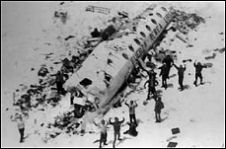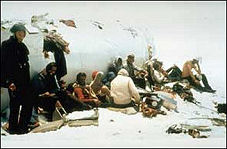Gonzalo Arijon‘s Stranded, which knocked me down at last January’s Sundance Film Festival, is finally opening today. It deserves full consideration as an Oscar contender for Best Feature Documentary (unless it’s ineligible). I’m sorry but it’s much more spiritual and primal than Trouble The Water (the King Kong of amateur-video jiggle docs) or Alex Gibney‘s Gonzo. In my head it’s second only to James Marsh‘s Man on Wire.
This deeply moving doc about the Uruguyan plane-crash survivors who were forced to resort to cannibalism after landing in the snow-covered Andes mountains in October 1972 and being stuck there for 72 days, opens today at Manhattan’s Film Forum, at L.A.’s Nuart on 11.7, and then in various U.S. cities between now and mid-December.
Stranded is partly a first-hand, looking-back, talking-heads doc, partly a revisiting of the crash scene piece and partly a grainy, dialogue-free re-enactment. It’s touching from the start, and holds you all through its 122-minute length.
This famous saga, dramatized in Frank Marshall‘s Alive (’93) as well as Piers Paul Read‘s “Alive: Sixteen Men, Seventy-two Days, and Insurmountable Odds–the Classic Adventure of Survival in the Andes,” is about how 16 young men (most members of a rugby team) managed to survive the ordeal by eating the flesh of those who’d been killed.


It’s as good as — certainly in the realm of — Kevin McDonald‘s Touching The Void. Right away you sense this is no run-of-the-mill deal. The emotionally delicate tone and complex layers and shadings imply from the get-go that Arijon has the hand of a poet-maestro.
The doc’s unique aspect is not only talking to many of these survivors (kids at the time, now in their 50s and 60s), but also joining them on a trip back to the site of the crash for some reliving and reflecting. It’s a real
